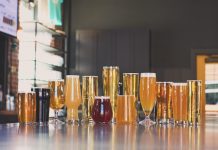
Photograph by Jo Tapper
When a brewery wants to design and develop a novel, efficient machine to improve beer production, they’ll probably call a mechanical engineer. But for a small, fast-growing craft brewer with a limited budget and resources, the beer-loving college students from the nearby engineering school might just be the best resource. Heck, sometimes the students are the ones calling the brewery.
Senior engineering students at Georgia Tech are required to complete a mandatory capstone design course, obliging them to work in teams on actual industrial challenges—designing, building and testing prototypes with real-world applications. And inevitably, at the beginning of each semester, Monday Night Brewing cofounder Joel Iverson’s email inbox starts filling up with solicitous missives from eager young engineers who only want to help. And meet their graduation requirements. And work with beer.
“We probably get 10 requests every semester,” says Iverson, who owns Monday Night along with partners Jonathan Baker and Jeff Heck.
Iverson figures MNB has worked with more than a dozen teams from Georgia Tech since 2010. But until this spring, none of them had created something that could actually be used in production.
For one thing, it’s a challenge to go from concept to workable product in the span of just a semester—about 15 weeks. And untested undergrads can set impractical goals. In those circumstances, Iverson believes part of his job “is to be brutally honest with them about what’s realistic and what isn’t.
“We’ve had plenty of groups with pie-in-the-sky aspirations, like they were going to solve some crazy problem that would revolutionize brewing,” he says, “But if they come in with a good idea, I’ll help them think through it.”
There have been a lot of strong ideas, Iverson says. One group proposed a system to recover steam energy and carbon dioxide, but it was too big for MNB. Iverson actually sent the students to the Anheuser-Busch plant in Cartersville, “and they were thrilled to see it already taking place in our industry.”
And there was a group three years ago with a clever innovation for the end of MNB’s bottling line, “basically a drop-packer, a machine to place 24 bottles into a case box using a mechanical arm and conveyors,” says Iverson. “They put a lot of work into it and got about 80 percent of the way there. Then the semester ended and they went onto their careers. We still have the parts from that unfinished machine.”
Then, this past spring semester a capstone team of five mechanical engineering seniors from Tech, calling itself “Monday Night Variety Hour,” found a way to quickly, and cheaply, solve a conundrum for MNB: How to speed up the assembly of variety 12-packs.
“In most grocery stores the variety packs are the top-selling item,” Iverson says. “Craft beer consumers like variety and like trying new things. The problem is that it’s cost prohibitive for many small to medium-sized craft breweries to make variety packs because of the added labor cost.”
Small craft breweries traditionally stuff these boxes manually, which Iverson says makes it one of the most expensive labor costs. So the students developed the “Beer Shuttle,” a low-cost ($413.85), low-tech machine that speeds up production of variety 12-packs, substantially reducing the hefty labor costs.
The wooden Beer Shuttle has a hopper at the top where operators load the cans into three different chutes, one for each of the beer styles that go into every 12 pack. It’s entirely mechanical—no electricity required. Gravity does the work. Cans slide down the loader and are grouped into dozens by two comb gates, then released into boxes. The cases are packed tight and loaded by human hands before landing on store shelves. The entire machine (about six-feet long and four and a half feet at the hopper), takes only a couple of minutes to set up or break down.
“There are machines that can do this for the large breweries, but they’re too big and too expensive for Monday Night Brewing,” says James Morris, who, along with Monday Night Variety Hour teammates Curtis McPeek, Sam Derochers, Michael Dean, and Lachlan Page, designed the hopper. It used to take five employees 19 seconds to stuff a 12-pack box, or 4.2 man-hours per pallet. With the Beer Shuttle, it takes a crew of three to four operators 12 seconds per box, or 2.2 hours per pallet. Now whenever you see a 12-pack Case of the Mondays on a grocery shelf, rest assured it was assembled by the shuttle.
The Beer Shuttle was actually one of two Georgia Tech capstone projects put into play by Atlanta breweries this spring. A team of eight students majoring in Industrial and Systems Engineering also designed software for Scofflaw Brewing to help the company manage its plan to double production to about 14,000 barrels per year.
The project was a labor of love for the students, who reached out to almost every brewery in Atlanta. Scofflaw was the first one to respond.
“I love beer,” says Reid MacArthur, the student team leader (they settled on Team Scofflaw for a name). “And Scofflaw makes really good beer. We were at the brewery every Friday for data collection, so that was pretty cool.”
Ultimately, working on a solution to the sampler pack woes was the perfect challenge for the Monday Night Variety Hour team, says McPeek.
“The great thing about this project is that it was small enough that we could get it all done in a semester, and big enough to make a difference for the brewery.”
Read more: Learn why a lot is at stake with Monday Night’s big expansion to the Westside
Jerry Grillo is a science writer and communications officer at Georgia Tech and a freelance contributor to Atlanta magazine.













